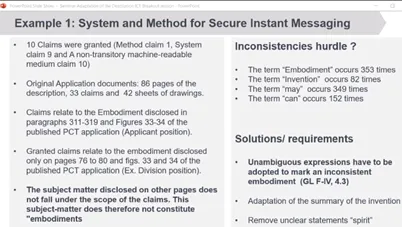Report on 23 June 2022 EPO Conference on Adaptation of Disclosure
The EPO conference of 23 June 2022 about adapting the disclosure was on-line and well attended The panelists were deeply experienced and included Justices Matthias Ziggan of the Munich regional court, Rian Kalden of the Dutch and Benelux regional courts, and Andreas Haderlein of the EPO Boards of Appeal (BoA).
The upshot of the conference is that the EPO deems Art. 84 EPC to require the disclosure to align with the claims as granted. The EPO finds that the weight of the BoA caselaw supports only this view and the few recent cases to the contrary cannot change that outcome. Further, the EPO finds current practice by the examining division to lack consistency. The EPO will likely amend the Guidelines to require a more standard process for pointing the applicant to areas of the disclosure that the division finds in need of adaption to company with Art. 84 EPC (of the European Patent Convention). What will constitute proper and sufficient “adaption” to meet this requirement under Art. 84 EPC remains to be worked out.
Turning to the conference, the EPO showed a slide of two columns of BoA decisions, with one column listing many cases finding that the EPC required adaption and the other column listing two recent decisions that found otherwise. The cases finding otherwise include T 1989/18 and T 1444/20. In discussions, the EPO worked to limit 1444/20 its facts and find it was not against EPO adaption practice in general. The EPO spent little time on 1989/18.
To support a basis for finding Art 84 EPC required adaptation of the specification and to take up protest from those with an opposing view that the requirement was not there in the EPC and it was harmful to patent applicants and patentees, the EPO threw the questions to the Justices. Both Justices Zigann and Kalden were in sequence asked if they thought the adaption practice was needed. Both Zigann and Kalden were emphatic that it was needed and that “good” patents required a disclosure that was aligned with the claims. Justice Zigann noted that interpretation in Germany takes the disclosure, which includes the text and the drawings, as of “stellar” importance. Justice Zigann noted that even when the claims are clear, German law requires a thorough reading and study of the text and drawings to make sure that the claim interpretation offered by the claims “makes sense”.
Although nothing was finalized, it will be very surprising if the EPO were to not move forward with an amendment of the Guidelines that directs a more rigorous adaption practice. Such a practice is one that will likely require the applicant and patentee to be more definite about which part of the disclosures are limited to subject matter outside of the granted claims and also which technical features disclosed are required for the claimed subject matter.
U.S. attorneys should know that U.S. drafting practice is not warmly embraced by the EPO, especially the use of the terms “may”, “can” and “embodiment”. Above is a slide presented during the conference that tallied the use of these and other problematic terms. It seems that the EPO may move to penalize through procedure the broad use of these terms.



